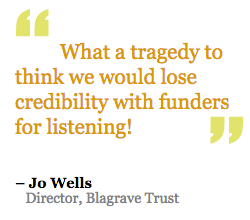What is Giving Compass?
We connect donors to learning resources and ways to support community-led solutions. Learn more about us.
Excerpt from Leap of Reason Update, July 2017
Years ago, when we first started writing about what it takes to become a high-performance organization, we tended to emphasize logic and brainpower, as exemplified by our title Leap of Reason. We've since gained a deeper appreciation for the essential role of heart, which led to writings such as "Wish You Had this Much Passion?," "Got Empathy?," "What Fuels Passion for Mission?, and "A Better-Angels Funder Practices What It Preaches."

Now, thanks to a group of Leap Ambassadors at the forefront of the "constituent feedback" movement, we've come to recognize that the ears are just as essential. In other words, you can't be a high performer if you don't listen carefully and systematically to the insights of the people you aspire to serve.
Recently, we asked Brad Dudding, David Bonbright, Dennis Whittle, Kathy Reich, Fay Twersky, Melinda Tuan, and other constituent-feedback experts which funders were doing the best work to help their grantees listen well to beneficiaries. We heard a resounding endorsement of the UK's Blagrave Trust, a foundation with a modest budget and tiny staff. So we reached out to Blagrave's director, Jo Wells, to hear from her. The full story of Blagrave's journey is coming this fall as part of the Leap Ambassadors' Funding Performance series, but here's a teaser.
The Blagrave Trust, which will grant about $2.6 million this year, got its start in 1979, thanks to two wealthy businessmen. For years, the foundation was driven mainly by trust and estate considerations, with no clear strategy or focus.
Four years ago, the foundation's trustees hired Wells, a development expert, to transition the foundation from charitable check-writing to a more-impactful approach.
Wells navigated by a North Star she found while living near the equator: First, do no harm. A relief project in Brazzaville, Republic of Congo, crystallized for her that even the most professional and well-meaning aid organizations and donors rarely listen to the people they aspired to help. When she moved to Congo to help reconstruction efforts following years of war, "I was told, 'Your role is to develop an agricultural rehab program based around the provision of seeds and tools. It's what we've done elsewhere. That's our model," Wells recalls. "But when I [talked] to people in the community, I found out they had different views about what they wanted."
And yet the aid organization felt unable to adapt, because significant funding was already in place based on pre-determined objectives. "We didn't want to go back to our funders. We feared we would lose our credibility with them. That's crazy to me now. What a tragedy to think we would lose credibility with funders for listening!"
For the past two years, Wells has been on a tear to ensure that Blagrave won't be one of those funders. The organization's website plants a clear flag: "The Blagrave Trust believes passionately in the importance of listening, and responding, to those we seek to serve—both young people who benefit from what we fund and organisations that benefit from receiving those funds."
Wells has backed up this aspiration with "walk the talk" measures. She and her program colleague, Tessa Hibbert, have made feedback a core part of the application process. They've created a Feedback Fund to help organizations build cultures of listening—and will launch a second one soon. They've built a community of practice among grantees working on constituent feedback. They've commissioned research on Listening for Change. They've gathered anonymous feedback from grantees with help from Keystone. They've switched from project grants to 100% unrestricted core support. They've stopped asking grantees for bespoke monitoring reports that aren't useful to funder or grantee. Most impressive of all, Wells and Blagrave's five trustees recently decided to add two young beneficiaries to their board.
"I'm really uncomfortable with others saying we're an exemplar, because we're at the beginning of this journey," Wells says. "But I've been clear from the outset that listening to our partners and the young people they serve would be a central part of the Blagrave narrative." Blagrave's grantees affirm that the foundation does, indeed, listen and learn. We can affirm that doing so is critically important for achieving meaningful, measurable, sustainable results. And therefore, when we release a subsequent version of the Performance Imperative later this year, the ear will gain its rightful role alongside the head and heart.
Learn more at Leap of Reason Ambassadors Community.